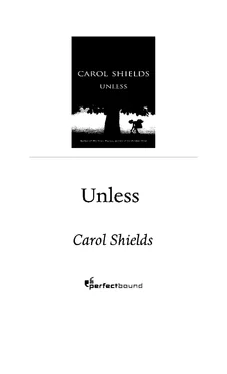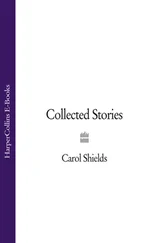Carol Shields - Unless
Здесь есть возможность читать онлайн «Carol Shields - Unless» — ознакомительный отрывок электронной книги совершенно бесплатно, а после прочтения отрывка купить полную версию. В некоторых случаях можно слушать аудио, скачать через торрент в формате fb2 и присутствует краткое содержание. Жанр: Современная проза, на английском языке. Описание произведения, (предисловие) а так же отзывы посетителей доступны на портале библиотеки ЛибКат.
- Название:Unless
- Автор:
- Жанр:
- Год:неизвестен
- ISBN:нет данных
- Рейтинг книги:4 / 5. Голосов: 1
-
Избранное:Добавить в избранное
- Отзывы:
-
Ваша оценка:
- 80
- 1
- 2
- 3
- 4
- 5
Unless: краткое содержание, описание и аннотация
Предлагаем к чтению аннотацию, описание, краткое содержание или предисловие (зависит от того, что написал сам автор книги «Unless»). Если вы не нашли необходимую информацию о книге — напишите в комментариях, мы постараемся отыскать её.
Unless — читать онлайн ознакомительный отрывок
Ниже представлен текст книги, разбитый по страницам. Система сохранения места последней прочитанной страницы, позволяет с удобством читать онлайн бесплатно книгу «Unless», без необходимости каждый раз заново искать на чём Вы остановились. Поставьте закладку, и сможете в любой момент перейти на страницу, на которой закончили чтение.
Интервал:
Закладка:
Oh, shut up, shut up.
Cappuccino foam dotted the corners of his undistinguished mouth. And just one more question, Mrs. Winters — Of course he didn’t call me Reta, even though there might be only a year or two between us. The “Mrs.” gave him power over me: that vexing r rucking things up in the middle and making one think of such distractions as clotheslines and baking tins. He was the barking terrier, going at Mrs. Winters’s ankles, shaking out his fur and asking me to justify myself, wanting me to explain the spluttering, dying, whimpering bonfire of my life, which I would not dream of sharing. He seemed to forget he was interviewing me about Danielle Westerman’s new book.
I understand you’re working on a second novel, said he. Well, yes.
Takes nerve.
Uh-huh.
Actually — actually, well, he had a novel on the go himself.
Really! What a surprise!
At the end of the hour he did not ask for the bill. I asked for the bill. “I’ll just put it on my Visa,” I said, breaking a tenuous breadth of silence. I announced this with all the majesty I could muster over a vinyl table, like a grande dame, adding twenty years to my age, and feeling the vowels shifting in my beautifully moulded throat. Such dignity; I surprised myself with my own resonance, and I may have managed a pained smile, displaying, no doubt, that famous overbite. He turned off the tape recorder at the word “Visa.”
He had two young children at home, he said. Christ, what a responsibility, although he loved the little bastards. One of them was quite, quite gifted; well, they both were in their separate ways. But the work of raising kids! Never enough time to read the books he had to review, books all over the house with little markers in them, books he would never finish. So much was expected, and of course, like all journalists, he was underpaid.
Oh, shut up.
They also expected him to do a feature on the weekend.
Uh-huh?
And last week he’d actually broken the MacBunna story.
Really? Macumba? Marimba?
Congratulations, said Mrs. Reta Winters from Orangetown.
Thanks.
I should be getting on my way, I said. My parking meter. A lunch date. A long drive home.
I understand you and your family live in a lovely old house near Orangetown. .
And then, slyly: I understand one of your daughters now lives in Toronto and. .
I’ve been here before. There is something about having an established family, a long-lasting spousal arrangement, three daughters in their teens, a house in the country, a suggestion of impermeability, that draws the curiosity of others so that they can, as Tom says, probe with probity.
But no, this man across the table will not be feeding on my flesh, nor will his colleagues — though one can tell that he has no colleagues; there is no possibility of colleagues. He has no context for friends or co-workers, though there are the kids and there’s the wife; he’s referred to her three times now. Nicola. She has her professional life, too, he tells me, as though the matter were in dispute.
I can’t resist. “Does Nicola — is she a journalist too?”
“Journalist?”
“Like you, I mean.”
His hand jumps, and for a moment I think he’s going to turn the tape recorder on again.
But no, he’s reaching into his pocket and now he’s releasing two coins onto the table. The tip.
They lie there, moist from his hand. Two dimes. I focus on them with what I hope is a cool, censorious gaze.
But he’s not looking at me. He’s looking across the room where a silver-haired man is seating himself gracefully at a table. “I’m not sure, but I think that’s Gore Vidal,” my interviewer whispers in a hungry voice. “He’s here for the writers’ festival, you know.”
I rise and exit, as though led by a brass quintet.
The charming Mrs. Winters slips on her comfortable beige raincoat. .
Wherein
It is late afternoon, early October, the sky darkening, and the lights in the old Orangetown Library already on. The smell of waxed floors is particularly sharp at this hour; it must be the heating system that triggers it.
Today, as always, the librarians, Tessa Sands and Cheryl Patterson, are helpful. I’ve dropped by to pick up Dennis Ford-Helpern’s The Goodness Gap. I am not, by the way, unaware of the absurdity of believing one can learn goodness through the medium of print.
Bookish people, who are often maladroit people, persist in thinking they can master any subtlety so long as it’s been shaped into acceptable expository prose.
I could easily have bought the Ford-Helpern book last week when I was in Toronto. But no, if I am sincere about achieving genuine goodness in my life and thereby finding a way to reconnect with Norah, this means dealing with issues large and small, or else shifting my finite dispersal of goodness to goodish places such as the public library. At the moment I am attempting to be a good citizen who supports her local library, which is dramatically underused by the community and in danger of closing.
Aside from a part-time custodian, these two librarians, Tessa and Cheryl, are the only full-time employees of the Orangetown Library; everyone else got the boot a year ago when the town council announced the library cutbacks.
Tessa and Cheryl have known our family for years. I’ve been a member of the Library Board forever, and Tessa remembers Norah from when she was four years old, attending Saturday-morning story hour, able to sit cross-legged and absolutely still, wearing only a nametag, not a sign saying GOODNESS. She was capable at that age of an exquisite shiver when listening to the adventures of Bluebeard and ready to shed tears over the fate of the twelve dancing princesses, a story that Tessa always reshapes for her young audiences. Happy endings are her specialty.
Tessa, in her fifties — married to a classical guitarist, mother to one adolescent child — is big, starchy, and pedagogic and getting more so every year. She possesses several lolloping chins, which shift as she talks, each one a millisecond out of sync with the movement of her surprisingly small mouth. She was a biologist before she decided to get her librarian’s qualifications. Her voice is clear and elocutionary.
Cheryl, divorced, in her late thirties, leans toward me today with both elbows on the desk, her chin cupped in her hands; her look is hunched and quizzical and surprisingly chic. Today she has a stick-on bindi in the middle of her forehead; I find it hard to avoid staring at this little colourful spot, which is in honour, I can only suppose, of the man she is currently seeing, a dentist trained in Bombay who has hung up his shingle at the Orangetown Mall, a shy young bespectacled man whose Indian wife couldn’t deal with small-town Ontario and went back to her parents after six months.
They are great friends, Tessa and Cheryl — colleagues — and they have the good sense to be proud of the generation-stretching bond they’ve devised. Snobbishness of a particular kind attends them, a case of old-style womanhood kissing up with the new — they’ve actually done it. It’s almost like love. They’re each so proud of the other, and like to express this reciprocal pride aloud. She knows exactly where to find things. Well, she’s the best there is when it comes to following up on the Internet. What they share is their dominion over this granite building, whose brown stones hint at the colour of the earth beneath, that good rich agricultural land so wisely set aside for the public good. Another serious budget cut, though, and this place will be a tea room-slash-gifte shoppe.
Tessa and Cheryl are united in their passion for books, books like Ford-Helpern’s, which they are happy enough to provide, but especially novels, novels that describe the unwrittenness of unremarkable men and women. Their instinct is to keep these books flowing toward those who have lost touch with the “real world.” I’m their number-one project these days. “Here’s the new Atwood,” Tessa tells me today, patting the book’s cover. “It came in yesterday, and I moved your name to the top of the waiting list.”
Читать дальшеИнтервал:
Закладка:
Похожие книги на «Unless»
Представляем Вашему вниманию похожие книги на «Unless» списком для выбора. Мы отобрали схожую по названию и смыслу литературу в надежде предоставить читателям больше вариантов отыскать новые, интересные, ещё непрочитанные произведения.
Обсуждение, отзывы о книге «Unless» и просто собственные мнения читателей. Оставьте ваши комментарии, напишите, что Вы думаете о произведении, его смысле или главных героях. Укажите что конкретно понравилось, а что нет, и почему Вы так считаете.












